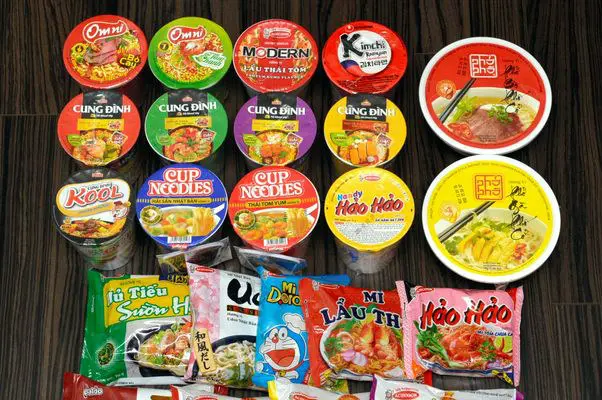Vietnam has one of the world's most ravenous appetites for instant noodles, and Japanese makers are determined to get the biggest bite they can.
Vietnam ranks as the fourth largest market for instant noodles after China, Indonesia and Japan. The country's economic growth is fueling lifestyle changes that Japanese manufacturers say are ideal for their expansion plans.
Vietnamese chowed down on 4.8 billion servings of instant noodles in 2015, according to the World Instant Noodles Association in Ikeda, Osaka Prefecture.
Given that Vietnam has a population of 90 million, that translates into more than 50 servings per person. The country accounts for 5 percent of global demand.
Japanese companies used to focus on noodles sold in plastic packages, which were cheaper, but they are now promoting relatively high-priced easy to prepare cup noodles to stimulate the market and cater to the growing ranks of wealthier people.
Acecook Vietnam Joint-Stock Co., a local subsidiary of Osaka Prefecture-based Acecook Co., controls more than 50 percent of the instant noodle market in Vietnam.
In July, Acecook Vietnam released Handy Hao Hao, a cup noodle product with more meat and vegetables. It is priced at 8,000 dong (36 yen, or 35 U.S. cents), more than double that for instant packaged noodles available for around 3,500 dong.
Acecook Vietnam first started selling the new instant noodle in Ho Chi Minh City, the largest city in Vietnam, and Hanoi, the capital, and other major urban centers. It expanded its sales network across the country in October.
Acecook Vietnam's newest plant is situated in an industrial complex that is a 40-minute drive from Ho Chi Minh City's central district.
The factory, filled with the aromas of fish sauce and oil to fry noodles, has three production lines, one of which is specially designed to make cup noodles.
The dedicated cup noodle line at the facility can annually produce up to 180 million servings of Handy Hao Hao and other cup ramen. Acecook Vietnam plans to set up another production line for cup noodles next year in northern Vietnam.
Its main product was Hao Hao, an instant packaged noodle that debuted in 2000.
A key reason for the company’s shift from packaged noodles to cup noodles was the surge in middle-income earners, primarily in urban areas, and their diversifying food preference.
Demand for instant noodles in Vietnam reached its peak of 5.2 billion servings in 2013, but the figure then slipped for two consecutive years.
Vietnam’s economy has been chalking up annual growth of 5 percent to nearly 7 percent, with per capita gross domestic product rising five-fold from 15 years ago.
This has led to a sharp rise in the number of fast food restaurants and convenience stores, and a preference for cup noodles over other instant noodle products because they are so easy to prepare, according to Acecook Vietnam officials.
“Cup noodles sell better than instant bag noodles at some shops in Ho Chi Minh City,” said Junichi Kajiwara, president of Acecook Vietnam. “It was impossible before to even imagine such a thing would occur.”
Acecook Vietnam intends to raise its sales ratio of cup noodles to all instant noodle brands from the current 2 percent to 5 percent by the end of 2017, company officials said.
Drive to expand consumption, exports
Many rival companies have also pitched cup noodles characterized by unique flavors or special ingredients in Vietnam.
In July, Nissin Foods Holdings Co. released Cup Noodles--its globally renowned brand of instant ramen--in Vietnam.
Although relatively costly at 12,000 dong to 15,000 dong, Nissin officials explained their strategy was to create demand for expensive noodles among middle-income earners.
South Korean and local food companies have also caught on to the demand for cup noodles.
“Vietnam’s population is still growing, and people are becoming wealthier, even in rural areas,” said Atsusuke Kawada, head of the Hanoi Office of the Japan External Trade Organization (JETRO). “There are opportunities to bolster consumption.”
As a signatory to the Trans-Pacific Partnership free trade pact, Vietnam will offer Japanese instant noodle makers a base to export their products once the TPP takes effect.
While Acecook Vietnam already exports its rice noodle and other products to North America and Europe, it plans to increase its ratio of exports to total sales from current 8 percent to 20 percent within three years.
(THE ASAHI SHIMBUN)
 简体中文
简体中文

